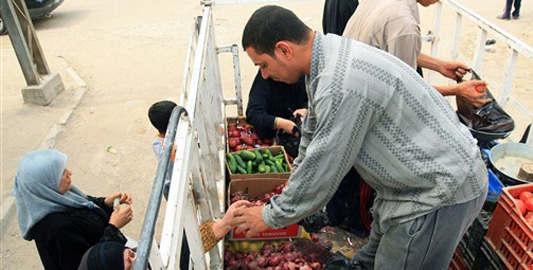Basra clashes leave Iraqis hungry
Forced indoors by fighting, families lose access to food and health care.

 |
| An Iraqi vegetable vendor sells his stock out of a flatbed truck in Basra after a curfew was partially lifted. Many shops and markets are still closed in the southern city [AFP] |
Residents in southern Iraq are hopeful that the al-Mahdi Army will heed calls by Muqtada al-Sadr, the influential Shia leader, to withdraw from the streets.
For nearly a week, clashes between al-Sadr’s forces and the government have forced hundreds of families in Basra, Kut and Kerbala to seek safety inside their homes.
“We need food and water,” Abu Kareem, a Basra resident, told Al Jazeera in a phone interview.
“Electricity has been cut off [for] three days and all food we had in our refrigerators has been lost.”
“Many houses are being used [by] fighters to hide and yesterday they entered my home twice, raising the dangers of an air strike over us,” the 52-year-old added.
“My sons and wife are scared and when I tried to refuse their [fighters’] entrance, I was beaten,” he added.
Yearning for calm
Fighting continued in Basra on Sunday despite calls by al-Sadr for his troops to stand down and withdraw from the streets, dashing the hopes of residents who yearned for calm.
“I’m glad that our cleric decided to call for the militia to withdraw but I’m not sure it will work out,” Ala’a Salah, a Basra resident, said.
“When you cease fire without addressing the main issues facing our society, the wound will be open and ready for any new infection. I’m sure clashes will return but on a much worse scale.”
Salah added that the temporary ceasefire has allowed his family to get food, petrol for generators and clean water. But as soon as it is safe, he said, he will pack up and leave the city.
Abu Ali, a fighter for the al-Mahdi Army, said he will obey al-Sadr’s order, but does not believe all militia fighters will stand down.
“Some fighters are feeling used as they were told to fight for recognition and now to stop without any concessions being made to them,” he said.
“If we stop [fighting], we are going to be seen as losers and a weak group and the possibility to be politically recognised will be less likely.”
Health care woes
 |
| Al-Sadr called for his army to withdraw after a week of street clashes [GALLO/GETTY] |
The International Committee of the Red Cross (ICRC) has expressed concerns that continued fighting in southern Iraq could create a humanitarian crisis in the region.
“Hospitals in Basra and in parts of Baghdad are running out of medical stocks, food and fuel,” said a Red Cross volunteer who asked to remain anonymous because he was not authorised to speak to the press.
“Aid workers have been prevented from entering Basra for security reasons while the need for aid is urgent. Some families have told me by phone that in some houses children are starving and armed groups aren’t responding to appeals from civilians,” he said.
Ali Dureid, another Basra resident, told Al Jazeera that after his brother has been killed outside his home, the family had to wait for hours before carrying the body inside.
They also had to delay his burial for two days while they waited for fighting to subside in their neighbourhood.
“A foul smell started to come from his body,” 34-year-old Duraid said.
Dureid added that he understood why the al-Mahdi Army militia have taken up arms, but said the killing of innocent civilians does not ultimately serve their interests.
“They are fighting to be recognised, but how can Iraqis [recognise] them if what they are doing is letting innocent civilians die under their ideals?”
Deserted streets
| Profile |
The recent fighting has left Basra’s streets deserted, with al-Mahdi or Iraqi Army forces blocking all roads.
Though the imposed curfew allows residents to look for food from 6am to 6pm, shop owners are keeping their stores closed, fearing violence and air strikes.
Hussain, a shopkeeper in central Basra, says the fighting has prevented him from reaching his small grocery.
“I was scared to be killed if clashes are renewed,” he said.
“I have taken my family and fled the city and hope to find my business, which I took years to build, still standing when I get back.”
Seeking political clout
Armed groups have said they will not stop fighting until their political clout has been officially recognised by the Arab World.
“We want to be respected and documented,” Haydar, a masked, Kalashnikov-toting al-Mahdi Army member told Al Jazeera.
“We won’t stop fighting for our ideals whatever the prime minister says.”
“If attacks against our army continue, we will use more aggressive tactics and it includes against oil fields in Basra,” the 31-year-old fighter added.
